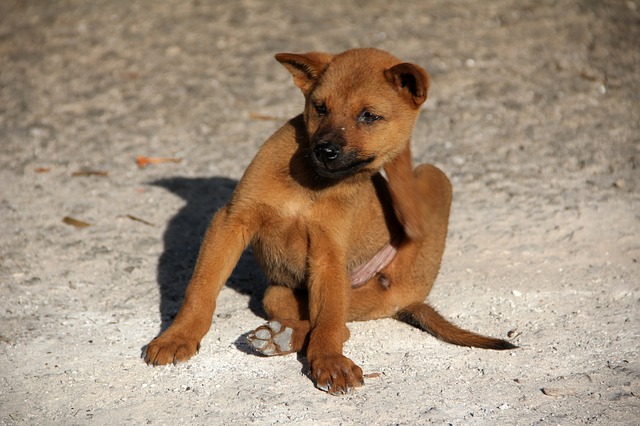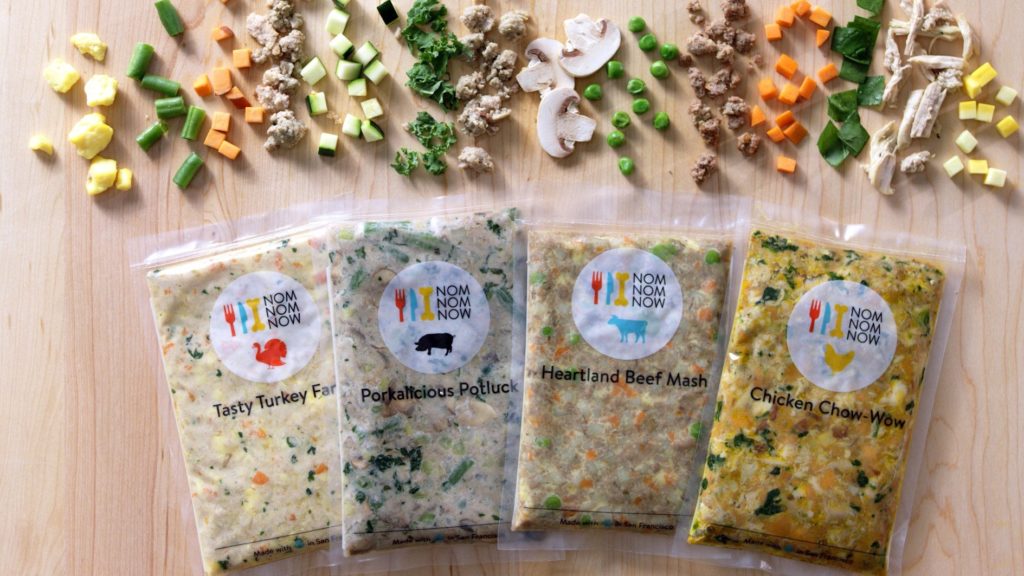
Sneezing, watery eyes, and stuffy noses come to mind when we think of allergies. Although dogs can exhibit respiratory problems due to an allergic reaction, it is more common to see skin problems in dogs with allergies. Let’s look at the symptoms, causes, and treatments of allergies in dogs. With some expert advice from our friends at NomNomNow, clear skin and an itch-free living are in your pup’s future!

What do Allergic Reactions Look Like in Dogs
One of the jobs of a dog’s immune system is to fend off intruders that cause illness. Like microscopic ninjas, armies of antibodies rush to the battlefield within your dog’s body, drop kicking the bad guys and returning the body to a healthy state. Although a dog’s immune system is always well-intentioned, it is not a perfect system. Sometimes it causes more harm than good.
When a dog is exposed to an allergen, the immune system senses a foreign body and kicks into gear trying to eradicate the invader. The problem is that the allergen is not actually harmful to the dog in and of itself but the immune system perceives it as a threat. As the immune system fires off a defense, antibodies flood the system. One of the byproducts of this process are chemicals called histamines. Histamines are the root of allergy symptoms.

Common Symptoms and Causes of Allergies in Dogs
As a dog’s body becomes overrun with histamines, inflammation soon follows. In a dog, this can show up as redness, swelling, and itching. Hot spots, red rashes, general itchiness all over the body, scaly or crusty skin, and the appearance of bald spots are all common. More rarely, a runny nose, cough, and eye discharge can occur.
The most common types of allergies in dogs include seasonal allergies, flea allergies, and food allergies. Seasonal allergies are thought to be inherited and come about as a result of a dog inhaling the offending plant or pollen-based allergen. Flea allergies are the most common type of allergy in dogs and are a reaction to the saliva of fleas. Food allergies are fairly common as well, but can be tricky to identify. Talk to your vet if you suspect your dog has allergies. She can guide you on diagnosing allergy type or identifying your dog’s allergens.

How to Treat Allergies in Dogs
When humans experience seasonal allergic reactions we typically take over the counter antihistamines like Benadryl. In more severe cases, doctors may prescribe steroids. These two courses of action are helpful to bring temporary relief to dogs as well. The trouble is, they do not address the underlying cause of the allergy and thus, symptoms often recur when the dog is exposed to the allergen again.
If fleas or food sensitivities are the cause of your dog’s allergic reaction, prevention is the best medicine. Keeping up with a flea preventative medication year round is especially important if your pup is sensitive to fleas. Although the culprit of food allergies can be more difficult to pin point, it is not impossible with patience and diligence.

Elimination Diet to Determine Food Allergens
Dogs can develop hypersensitivities to virtually any food but there are some ingredients and types of food that are more frequently associated. The VCA says that dairy products, beef, wheat gluten, chicken, chicken eggs, lamb, and soy are commonly associated with food allergies in dogs. With that in mind, how do you know which ingredients or types of food are causing your dog to have an allergic reaction?
NomNomNow, the fresh food partner of iHeartDogs, has the answer for you. They have a board-certified veterinary nutritionist, Dr. Justin Shmalberg, that is an experienced expert in fresh food for pets, and they recommend taking the following steps to conduct a food trial or elimination diet.

Changes to your dog’s diet should be introduced slowly to avoid gastrointestinal upset. A consultation with your veterinarian, allergist, or board-certified veterinary nutritionist is recommended to make a game plan for eliminating diet-related allergies.
Steps to Conduct a Food Trial, as Recommended by the team at NomNomNow:
- Feed them entirely new and generally pure food for a minimum of eight weeks. Feeding your dog a non-contaminated, simple ingredient diet for the entire trial period will provide the most accurate results.
- The diet can be cooked or commercially produced. Dog food that has single sources of animal protein, vegetable protein, and carbohydrate calories is an ideal choice. Consider fish and potato or rabbit and peas. Avoid foods that include other natural flavors as those can consist of unidentified proteins.
- During the food trial, do not feed your dog any treats, table food, supplements, or flavored medications (if possible).
At the end of the eight weeks, slowly reintroduce specific ingredients one at a time. If your dog reacts, then you know which food is the culprit.

Fight Food Allergies with Fresh Food
The key to controlling your dog’s food allergies may be to switch them to a fresh food diet. Commercial kibbles often contain soy, gluten, and other known allergens. Fresh dog food from NomNomNow includes amino acids and polyunsaturated fatty acids that improve coat quality, skin condition, and reduce inflammation caused by allergic reactions. Plus, ingredients can be strictly controlled with NomNomNow so any known allergens or sensitivities will never make it to your dog’s dish.
NomNomNow perfectly portions meals made with human-grade ingredients that are ideal for dogs with food allergies. Each serving of food from NomNomNow includes the NomNomNow Nutrient Mix, which is full of critically important vitamins and minerals needed to maintain skin and coat health. Vitamins A and E promote and protect the surface of the skin. Minerals such as selenium and zinc help to maintain a dog’s immune function. These components of the Nutrient Mix are just what your dog needs to help those allergy symptoms.

Dietary Changes to Address Specific Skin Conditions

Ready to make the switch to fresh dog for your allergy-prone fur baby? There’s no time like the present. Take advantage of a 50% discount being offered to the iHeartDogs community.
The post Allergy Advice for Pups with Itchy Inflamed Skin appeared first on iHeartDogs.com.
from iHeartDogs.com https://ift.tt/2olA0Vv https://ift.tt/2p4uabz

No comments:
Post a Comment